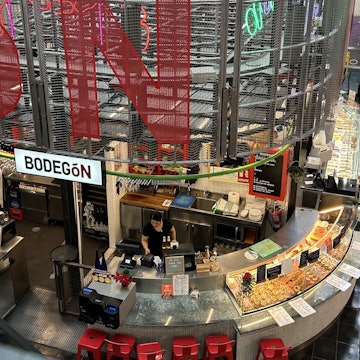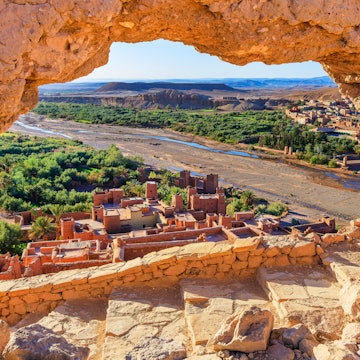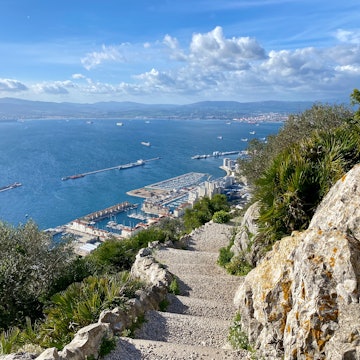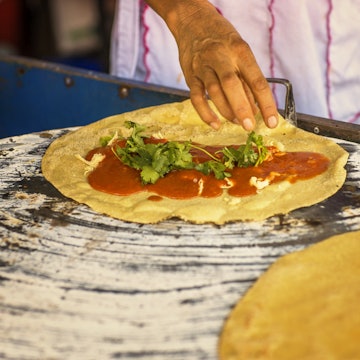
Here’s how to eat your way through Bilbao and Spain’s Basque Country

Sep 22, 2023 • 6 min read

In Spain’s Basque Country, bar counters positively team with pintxos, bite-sized snacks to be enjoyed with drinks © iStock / Getty Images Plus
When I moved to Spain, I knew that the country’s cuisine was vast and varied by region.
Yet I didn’t know much about where each local specialty came from, or even the difference between pintxos and tapas. (For the record: pintxos are bite-sized and meant to be eaten with your hands, while tapas are generally larger, served in small plates and eaten with cutlery.) One thing I did know was that pintxos hailed from the Basque Country (País Vasco). Having tried them at different Spanish restaurants around the world, I couldn’t wait to visit the region.

I quickly learned that Bilbao and the Basque Country’s cuisine is famous for far more than just pintxos. The region has vibrant food traditions and an matched passion for quality ingredients, from the succulent txuleta – a carnivore’s dream come true, it’s a local cut of locally sourced beef – to kokotxas, a local fish stew, and bacalao al pil pil, cod in a thick sauce made from olive oil, garlic and chili peppers.
Since I don’t drive a car in Spain, I set out to reach the region by plane and train. The biggest challenge to a cuisine-centered trip? A limited number of meals means you won’t get to try everything. After a year and a half of living in Spain, I knew that bookings are a must at some places, as well-known restaurants often don’t take walk-ins. (Mercifully, pintxos bars do.) If you want to try the famous txuleta at one of the Basque Country’s best steak houses, you’d be wise to book at least two weeks in advance.
Here’s everything I learned from my trip to the Basque Country – plus some ideas for what I plan to do on my next visit there.

Step 1: Choose where to go
Beaches or a world-renowned museum? Wherever you go, the whole region is a safe bet for great food.
The Basque Country is an autonomous region in northern Spain known for its robust culinary scene. Its main cities are Bilbao, Vitoria-Gasteiz and San Sebastián, each of them beautiful in their own right. Considered the artistic heart of the Basque Country and home to the Museo Guggenheim, Bilbao is my favorite – yet San Sebastián lures in visitors with its golden beaches. The less visited Vitoria-Gasteiz, the regional capital, offers a view into everyday Basque life and has a medieval quarter worth exploring.
Spaniards associate the Basque Country with abundant rainy weather, particularly in the fall and leading up to winter – though it seems like recent years have brought less rainfall. Summer has the least-rainy weather and warmer temperatures, though there’s never a guarantee it won’t rain at all, and you’ll encounter tourism at its peak. To avoid the crowds and high prices of the high season, the best times to visit the region are June and September. Yet there really is no wrong time to travel to the Basque Country.

Step 2: Plan a route
There are pintxos at literally every bar in Bilbao, and you won’t have time to try them all.
The first time I went to Bilbao, I asked everyone – from old friends to my hotel concierge – for recommendations on where to eat. Needless to say, my list of places to check out grew ever longer, so long that even a hearty eater such as me couldn’t possibly try them all. What’s brilliant about pintxos is that the tasty morsels, often held by a toothpick or served over a slice of baguette, are small enough to allow you variety at every meal. But you shouldn’t eat all in one stretch: as comfortable as you may find that cozy bar stool, you should only order two or three pintxos before making your way to the next venue. Bar-hopping in search of the perfect pintxo is part of the fun.

Several routes offer a tour of some of the city’s tastiest pintxos. After having eaten my way through town, I’d recommend you start at Plaza Nueva, a square with neoclassical architecture located at the heart of Bilbao’s Old Town. The square is lined with bars that you can wander in and out of, assessing the displays of pintxos on every counter. Be adventurous and taste widely – yet stay selective, as you don’t want to fill up with anything that’s less than stellar. At Gure Toki and Sorginzulo, every dish is a work of art, and every pintxo bursts with flavor. You’ll even find miniature versions of such famous Basque dishes as bacalao al pil pil.
Another area for a pintxo tour is the Indautxu neighborhood, where you shouldn’t miss the oysters at El Puertito and the cheese-based pintxos at Gaztandegi. Make sure you pair them with a glass of local Txakoli wine. The Old Town is full of notable options, too, like the stuffed mussels with béchamel sauce at Baste. The riverside Mercado de la Ribera also deserves a wander.

Step 3: Book ahead
To try local specialties like txuleta, make sure you book ahead at a reputable steak house.
Once you’ve spent a day or two pintxo-tasting through town, treat yourself to a sit-down meal or two. Only open for lunch (booking at least two weeks in advance is advised), Kate Zaharra is my pick for a txuleta that you’ll remember for years to come. Well-heeled patrons gather at the restaurant for Sunday family lunches, which also makes it a great spot for people-watching. Plus, since it’s located high up in the hills of Artxanda, the views from its terrace are unparalleled. You can only arrive by car; taxis are readily available.
You won’t want to leave the region without tasting specialties like bacalao al pil pil and kokotxas, too. Victor in Plaza Nueva has been making the former on the same premises since the 1940s, while at Trueba, a highly rated restaurant with a modern dining room, kokotxas and other fish dishes fly off the menu.
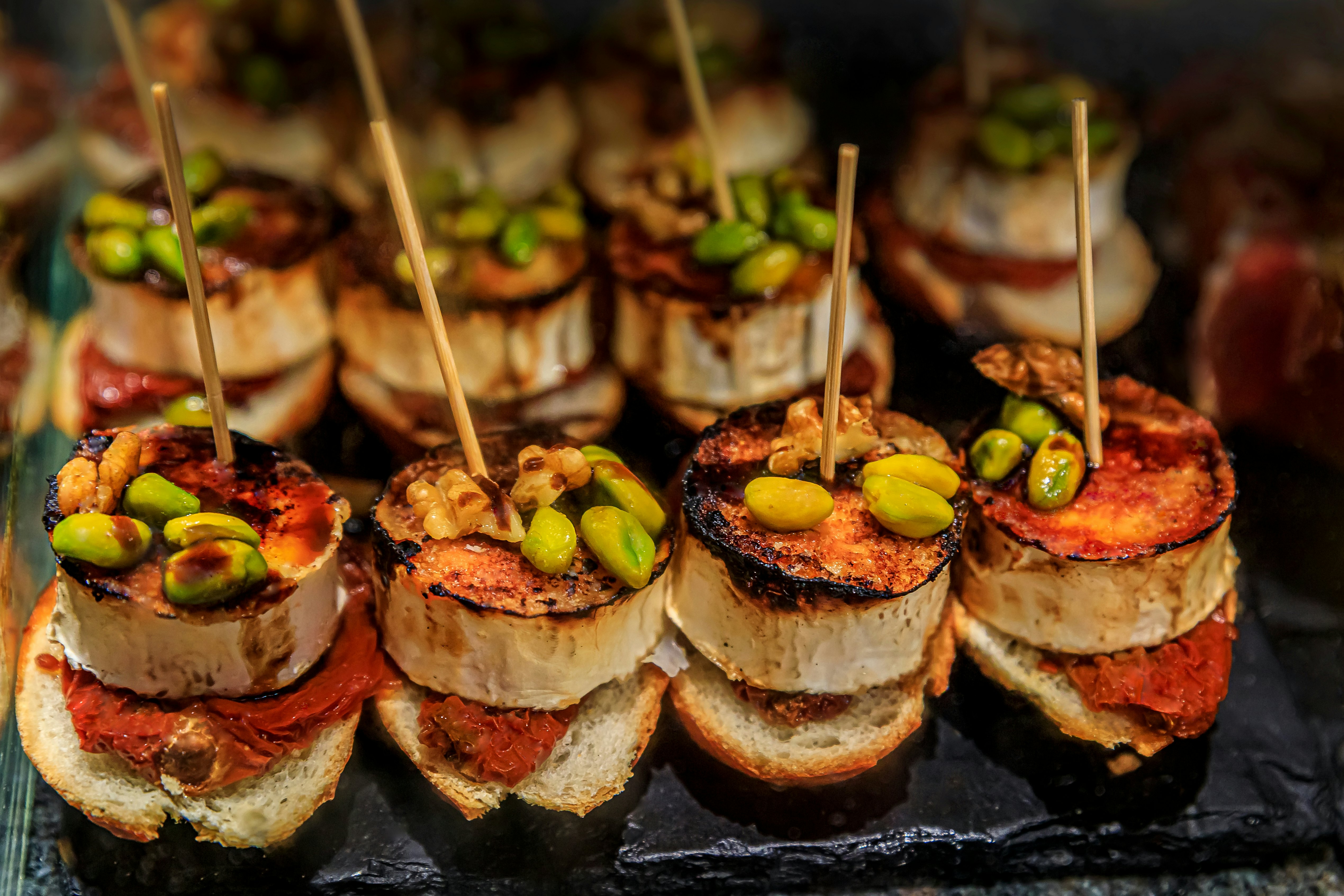
If I could do it all again…
I can’t emphasize enough how important it is to book ahead – something that goes for renowned restaurants in most of Spain. The txuleta at Txakoli Simon was highly recommended to me by a trusted acquaintance, but I couldn’t get a booking even calling two weeks in advance. Next time, I’ll try booking a month ahead. I would also love to check out some of the places names to the 2023 50 Best Restaurants in the World list: Asador Etxebarri, Mugaritz and Elkano are all located near Bilbao or San Sebastián.
Finally, I would follow my own advice and start my pintxos route directly at Plaza Nueva. I missed out on trying many pintxos that caught my eye at Gure Toki because I was too full to fit any more in. That’s where I’m starting next time.








